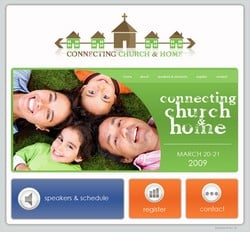This is a live blog by Terry Delaney during the Connecting Church and Home Conference March 2009 at Brentwood Baptist Church in Nashville. You can also read confernce notes on the Soujour Kids blog or from the Thoughts On The Word
Session #3: The Next Step-Family Strategy of Brentwood (Jay Struther)
And Ruth the Moabite said to Naomi, “Let me go to the field and glean among the ears of grain after him in whose sight I shall find favor.” And she said to her, “Go, my daughter.” So she set out and went and gleaned in the field after the reapers, and she happened to come to the part of the field belonging to Boaz, who was of the clan of Elimelech.
And Naomi said to her daughter-in-law, “May he be blessed by the Lord, whose kindness has not forsaken the living or the dead!” Naomi also said to her, “The man is a close relative of ours, one of our redeemers.” Ruth 2:2-3, 20
 If we have a vision without a plan, our vision will fall apart. I think this is what is true in many of our ministries. When I first got into ministry 13 years ago, it was all about the big events. Today, we have seen that that does not work nor has it developed a lasting faith. Andy Stanley says, “It’s not your intention that determines where you end up. It is your direction that determines your destination.”
If we have a vision without a plan, our vision will fall apart. I think this is what is true in many of our ministries. When I first got into ministry 13 years ago, it was all about the big events. Today, we have seen that that does not work nor has it developed a lasting faith. Andy Stanley says, “It’s not your intention that determines where you end up. It is your direction that determines your destination.”
This past summer I had the opportunity to preach during our family series. This past summer we discussed about the disfunctionality of families today and in the Bible. I preached from the book of Ruth. Many of you know the story found in the book of Ruth. Ruth only knew how to survive. However, they just so “happened” to be in the field of Boaz, the kinsmen redeemer. When Ruth took a step of faith, God guided and directed her steps to the man who could give them a better life insofar as life in this world is concerned.
I found here in Nashville a community of rich, young rulers. There are many who hold onto themselves as what is sufficient for them to live. This is our pride. Those who have been there and done that do not get excited about all of the big events and big name concerts. God was showing me how I needed to get back to the basic issue of teaching the gospel to our children. We went in the radical direction of small group ministry.
We found that our kids were dying for authentic relationships not the big events. We decided to take the kids that God had given us and make them disciples of Christ (Mt. 28:18-20).
As we took this journey, we began to notice that we were missing the other side of the coin. Our small groups grew exponentially, but we noticed that there was something missing. We realized that we needed to engage the families. I would like to present what we did to engage the families of the kids in our small groups.
1. Stop, Look, Listen
We had to stop what we were doing and look around. After looking around we needed to listen to what our families needed. I would like to challenge you ministers and parents to the biblical mandate of the Sabbath. We need to slow down in order to recharge and spend quality time with our family and our Lord.
There is always room for growth. Our staff has a day of prayer and meditation where we get away during the “work” week once a month to stop what we are doing and look to see where God is at work.
2. Proclaim the family as Biblical Priority
Does your church know how important your family is to you? If we don’t ground what we do in Scripture, it becomes just another fad. We point our families to Proverbs 22:6 and Deuteronomy 6. Every child is a creation of God. A parent is in the best position to understand their child. Are you teaching your people what the Bible says about the family?
3. You need to communicate a clear and consistent message at every level in your church.
You need to grasp the family and embrace it and show it to your church. You must set the example for your folks. You need to carry this message until you are sick and tired of saying it. It is usually at this time that your people just begin getting it. There are many opportunities within your church if you look for them.
4. Enlist church leadership. You cannot do it alone.
You need lay leadership to move this forward. As the staff member, you have more than your share of work to do. To do this, you must cultivate a church-wide culture of loving the family.
5. You need to build a team and find a champion.
One of the key steps is to get the right people “on the bus” and then drive it. The great thing about the church is that we know where the bus is going. We just need to know how to change our methods to get there. The biggest problem is the culture in our churches. We have been “siloed” so long, that making this change will take much work.
Jesus had 12 disciples because discipleship takes much time and energy. Ephesians 4 tells us that we are to equip the body for ministry. We have tried to superimpose the business model of a company on the church. We have relegated our congregation to consumers. We have relegated ministry to the “professionals.”
Acts 6 tells us that pastors are to be devoted to the Word and the prayer. The role of the minister is to equip. We are to give ministry away in order to shape the next generation. We start with our ministry team and then equip the parents that the Lord brings our way. General MacArthur said, “It is amazing what you can accomplish when you don’t care who gets the credit.”
6. Develop a clear strategy
This is what we have discovered and what we have implemented here at Brentwood.
- Catalyst—who are the spiritual catalysts in the life of a young person? Relationships are the primary catalysts in these lives.
Parent is the primary (Deuteronomy 6:7)
Leaders in the church - Content—how do we know that our kids can articulate biblical truths
- Context—our ministry environments (ministry programs and events)
Here is our ministry plan at Brentwood Baptist based upon Deut. 6:7
- Love God as a way of life (worship)
- Love others as a way of life (service)
- Love the church and understand their roles in the body of Christ (community)
- Love the Bible and can handle it properly as the authority and foundation for life (Scripture)
- Love to tell others about Christ (the gospel) and share their stories (testimony)
- Love to grow closer to God through personal spiritual disciplines such as prayer and Bible Study (discipleship).
We have seven ministry strategies:
- Synchronize our ministry efforts around this master plan to build faith and character in our sons and daughters
- Communicate this expectation and plan clearly to parents.
- Develop a resource guide that suggests to parents recommended resources for family devotions and specific family issues
- Connect our teaching ministries to the home
- Provide catalyst venues that introduce parents to Parenting 6.7
- Partner with the missions ministry in 2009 to provide family-friendly mission opportunities
- Partner with the music and worship ministry to focus on intergenerational and family worship gatherings
7. You just need to take that step like Ruth. You need to implement, evaluate and adjust.
We often times overestimate what we can do in 10 years and underestimate what we can do in 1 year. I challenge you to ask yourself what is your next step that is God is calling your church to take to better equip your church to minister to your families.
About Jay Strother
Jay Strother is the Emerging Generations Minister at Brentwood Baptist Church. He’s been working with students, children and their parents since he was 19 years old. Jay graduated from Greenville (IL) College in 1997 and New Orleans Baptist Theological Seminary in 2006. He is married to his wife of 11+ years, Tanya, and their three lively little girls, Eliza, Lexi and Ella. Jay loves good books, good coffee and St. Louis Cardinals baseball.
About The Connecting Church and Home Conference

The Connecting Church and Home Conference is designed to equip church leaders with practical ministry strategies for impacting families within the church. Featuring nationally known leaders and ministry speakers, this conference is sure to impact your approach to building stronger families in your church.
Special thanks to Terry Delaney who contributed this guest post. To read more of Terry’s writing visit Going To Seminary or Diary of a Seminary Student.
